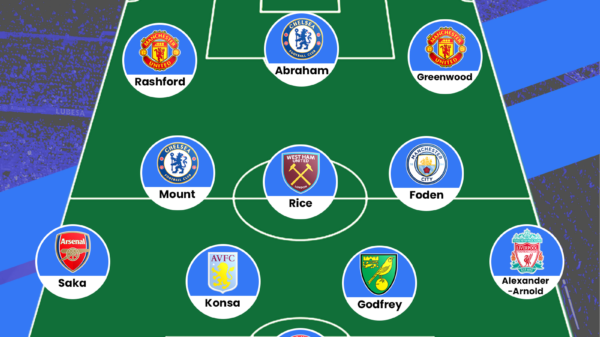Tim Sherwood’s talents as a motivator have already helped propel Aston Villa towards Premier League survival, but could his tactical changes and passionate approach lead to an unlikely top ten finish next season? Alex Keble takes a look at Villa’s individual performances since the Sherwood has arrived to find the answer.

With an abundance of Premier League talent at his disposal – from Scott Sinclair to Tom Cleverley to Christian Benteke – and an interesting playing style already beginning to take shape, Aston Villa might be next season’s surprise package.
Not unlike the revival of Emmanuel Adebayor last season at Tottenham, Tim Sherwood has helped Benteke re-find his goalscoring form thanks to his classic arm-around-the-shoulder techniques and a tweak in Villa’s tactics – that has made the Belgian the fulcrum upon which Villa’s attacks swing.
Unlike his predecessor, Sherwood has ensured that long balls are frequently hoisted towards Benteke, in the knowledge that his power and aerial dominance will make the ball stick to him. In a remarkable turn around in playing style, Benteke wins an average of 10 headers per match under Sherwood, up from 4.7 per match under Lambert.
Of course, the most obvious benefit of an in-form Benteke is his goalscoring ability (he has netted 8 times in 6 games, up from 3 in his previous 21), but his link-up play should not be underestimated. Benteke has also average 2 key passes per game during this recent flurry of goals, representing a significant increase from his season average of 0.8.
Villa will be desperately hoping that they can hold onto their star striker for one more year, because with such a talented individual leading the line – both as scorer and creator – Villa could easily challenge for a top half finish.
Alongside Benteke, key to Sherwood’s new swashbuckling tactics has been forging a strong central midfield partnership between Fabian Delph and Tom Cleverley, the latter of whom looks reborn under his new manager.
Whilst Delph’s forward movement on the ball represents his most potent threat (67% of his passes are forward), Cleverley focuses primarily on one-touch passing and quick movement, sewing up the lines between defence and attack. Both players are superb on the ball (average 100 passes per match at 85% success rate), and highly intelligent – both in terms of their general positional play and high-tempo passing.
Delph and Cleverley flit back and forth across central midfield, working hard to maintain possession for their team whilst sweeping long balls onto the head of Benteke or over the top for Agbonlahor to chase.
It is a midfield partnership that will only strengthen with time, and one that could form the foundations of a composed, controlling first eleven – particularly given how his passion and confidence has already rubbed off on the players.
The contrast between Aston Villa’s self-belief before and after Sherwood’s arrival is plain for all to see; Villa’s players are moving, passing, and dribbling with a forward momentum that only comes with confidence. Memories of the Paul Lambert days of awkward sideways passing have already begun to fade.
Sherwood’s passionate outbursts and touchline antics have clearly galvanised these players, unlocking the potential that had remained hidden throughout Lambert’s tenure. And all of a sudden this squad seems full of talent: young centre-backs Ciaran Clark and Jores Okore have both been tracked by Manchester United, whilst Carles Gil’s average of 6.3 dribbles per 90 minutes is higher than Raheem Sterling’s, Angel Di Maria’s, and Philippe Coutinho’s.
In modern football the mental attributes required for managerial success are often overshadowed by tactical acumen, but Sherwood’s successes are testament to the power of man-management skills.
Another impressive feature of Villa’s tactics has been their bold defensive set-up. With confidence through the roof, Villa are holding an increasingly high back line and pressing the ball high up the pitch.
At White Hart Lane two weekends ago, Aston Villa atteepted an astonishing 50 tackles, well above their season average of 25. The effect of this strategy – that sees Gabby Agbonlahor and Benteke close down and Villa’s midfielders charge in behind them – has been to unsettle the opposition by stopping them from passing the ball out from defence.
It takes a mixture of courage and organisation to successfully harass opponents in their own half, and therefore it is perhaps this skill more than any that proves Sherwood has the coaching skills to both motivate and innovate.
Finally, Sherwood’s ability to recognise, and utilise, the energy and fearlessness of youth, could put Villa in contention for a top half finish. In the last two matches, 19-year-old Jack Grealish has made Villa’s starting eleven, once again displaying Sherwood’s belief in the importance of youth after the blooding of 16-year-old Rushian Hepburn-Murphy in the 4-0 victory over Sunderland.
Grealish has held a superb 93% pass accuracy across these two starts against QPR and Tottenham, showing great confidence and creative energy in an attacking midfield role (2 key passes, 3 dribbles).
It is this fearlessness and buzzing, novel approach to football that flourishes in youth, and that Sherwood – who gave debuts to Nabil Bentaleb and Harry Kane whilst Spurs manager – wishes to tap into. Struggling Man City could certainly benefit from taking a leaf out of Sherwood’s book and recognise the creative impulses that a fresh face can bring to the team.
Villa’s academy – winners of the European Youth cup last season – is amongst the most respected in Europe, and with Sherwood at the helm we can expect to see plenty more youngsters make their Premier League bow next season. There is no doubt that a player such as Grealish, who was signed by the club as a six year old, will bring passion to the Villa team; and after all, passion is what Tim Sherwood is all about.
With this newly rejuvinated Villa side, an uplifting new manager, and summer transfer window that could positively work to patch areas where the squad lacks, Villa could well be on course to be a top 10 side once again.
Written by Alex Keble
- Could Tim Sherwood turn Aston Villa into a top ten team? - April 21, 2015



























































